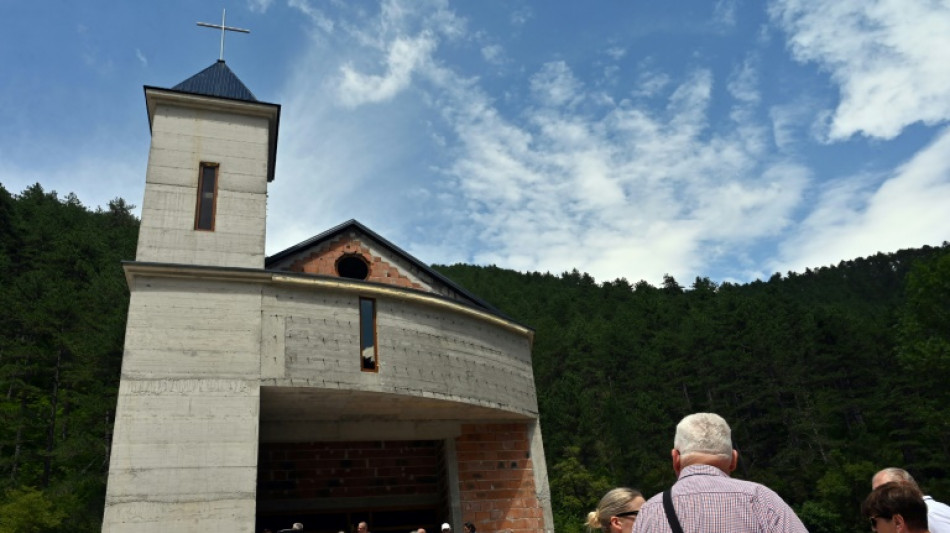
-
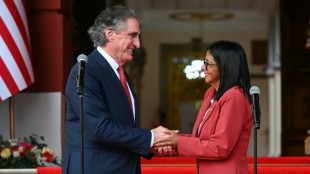 US says Venezuela to protect mining firms as diplomatic ties restored
US says Venezuela to protect mining firms as diplomatic ties restored
-
Trump honors Messi and MLS Cup champion Miami teammates

-
 Dismal Spurs can still avoid relegation vows Tudor
Dismal Spurs can still avoid relegation vows Tudor
-
Berger sets early pace at Arnold Palmer with 'unbelievable' 63

-
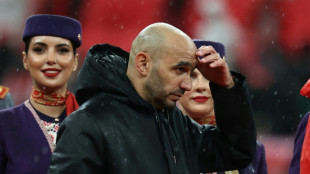 Morocco part company with coach Regragui as World Cup looms
Morocco part company with coach Regragui as World Cup looms
-
Lens beat Lyon on penalties to reach French Cup semis

-
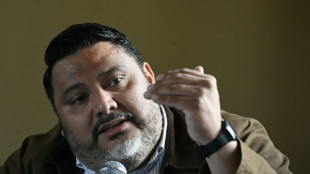 El Salvador's Bukele holding dozens of political prisoners: rights group
El Salvador's Bukele holding dozens of political prisoners: rights group
-
With Iran war, US goes it alone like never before
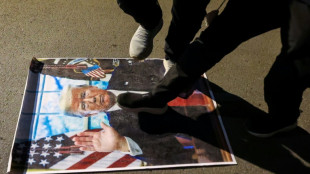
-
 Spurs slip deeper into relegation trouble after loss to Palace
Spurs slip deeper into relegation trouble after loss to Palace
-
European, US stocks back in sell-off mode as oil prices surge

-
 Pete Hegseth: Trump's Iran war attack dog
Pete Hegseth: Trump's Iran war attack dog
-
Celtics' Tatum could make injury return on Friday

-
 'Enemy at home': Iranian authorities tighten grip as war rages
'Enemy at home': Iranian authorities tighten grip as war rages
-
Bethell set for 'hell of a career', says England captain Brook

-
 France coach Galthie slams Scotland for 'smallest changing room in the world'
France coach Galthie slams Scotland for 'smallest changing room in the world'
-
Medvedev arrives in Indian Wells after being stranded in Dubai

-
 Trump fires homeland security chief Kristi Noem
Trump fires homeland security chief Kristi Noem
-
Mideast war risks pulling more in as conflict boils over

-
 Wales' James Botham 'sledged' by grandfather Ian Botham after Six Nations error
Wales' James Botham 'sledged' by grandfather Ian Botham after Six Nations error
-
India hero Samson eyes 'one more' big knock in T20 World Cup final

-
 Britney Spears detained on suspicion of driving while intoxicated
Britney Spears detained on suspicion of driving while intoxicated
-
Grooming makes Crufts debut as UK dog show widens offer

-
 Townsend insists Scots' focus solely on France not Six Nations title race
Townsend insists Scots' focus solely on France not Six Nations title race
-
UK sends more fighter jets to Gulf: PM

-
 EU to ban plant-based 'bacon' but veggie 'burgers' survive chop
EU to ban plant-based 'bacon' but veggie 'burgers' survive chop
-
Leagues Cup to hold matches in Mexico for first time

-
 India reach T20 World Cup final after England fail in epic chase
India reach T20 World Cup final after England fail in epic chase
-
Conservative Anglicans press opposition to Church's first woman leader

-
 Iran players sing anthem and salute at Women's Asian Cup
Iran players sing anthem and salute at Women's Asian Cup
-
India beat England in high-scoring T20 World Cup semi-final

-
 Mideast war traps 20,000 seafarers, 15,000 cruise passengers in Gulf
Mideast war traps 20,000 seafarers, 15,000 cruise passengers in Gulf
-
Italy bring back Brex to face England

-
 French policeman to be tried over 2023 killing of teen
French policeman to be tried over 2023 killing of teen
-
Oil prices rise, stocks slide as Middle East war stirs supply concerns

-
 More flights take off despite continued fighting in Middle East
More flights take off despite continued fighting in Middle East
-
Ukraine, Russia free 200 POWs each

-
 Middle East war halts work at WHO's Dubai emergency hub
Middle East war halts work at WHO's Dubai emergency hub
-
Paramount's Ellison vows CNN editorial independence

-
 US says attacks on alleged drug boats have spooked traffickers
US says attacks on alleged drug boats have spooked traffickers
-
Dempsey returns as Scotland shuffle pack for Six Nations clash against France

-
 India pile up 253-7 against England in T20 World Cup semi-final
India pile up 253-7 against England in T20 World Cup semi-final
-
Wary Europeans pledge 'defensive' military aid in Mideast war

-
 Seven countries to boycott Paralympics ceremony over Russia: organisers
Seven countries to boycott Paralympics ceremony over Russia: organisers
-
UK's Crufts dog show opens with growing global appeal

-
 PSG prepare for Chelsea clash with Monaco rematch
PSG prepare for Chelsea clash with Monaco rematch
-
Google opens AI centre as Berlin defends US tech reliance

-
 Second Iranian ship nears Sri Lanka after submarine attack
Second Iranian ship nears Sri Lanka after submarine attack
-
Portugal mourns acclaimed writer Antonio Lobo Antunes

-
 Union loses fight against Tesla at German factory
Union loses fight against Tesla at German factory
-
Wales revel in being the underdogs, says skipper Lake


'We can live together': church helps bridge Bosnia's deep divisions
Decades after bloody fighting between Catholics and Muslims ripped apart Bosnia's Bugojno, a new church has provided a rare opportunity to bridge the divides in the deeply fractured Balkan country.
Still under construction, the Catholic place of worship in the central Bosnian town is being built on land donated by Husejn Smajic, a 68-year-old Muslim resident, after he discovered the foundation of a medieval church on his property.
For Smajic, the new church represents a small step in a quest to rebuild the communal harmony common in Bosnia before the war in the 1990s.
"I did this so that people can see that we can all live together. There cannot be beauty of life here without the mixture of communities. It is our wealth," Smajic told AFP.
Amid the bloody dissolution of Yugoslavia, Bosnia erupted into a vicious civil war pitting the country's Orthodox Serbs, Catholic Croats and Bosniak Muslims against each other in a conflict that killed around 100,000 people.
Bugojno was hard hit during the war that was defined by bouts of ethnic cleansing, mass displacement and atrocities committed by all sides.
Most of the town's Catholic Croats, who made up more than a third of Bugojno's 47,000 inhabitants, were expelled by Bosniak Muslim forces.
- Life after war -
Nearly three decades later, many of the divisions that were exacerbated by the conflict have largely hardened, with Bosnia's three main groups rarely mixing.
A peace deal that succeeded in ending the war has left the country partitioned and controlled by ethno-religious political parties that have exploited Bosnia's divisions in a bid to maintain power.
With few economic opportunities, hundreds of thousands have moved abroad in the search of a better and more stable future.
The fracturing of Bosnia has been particularly painful for people like Smajic, who is in a mixed marriage with his Catholic wife.
Before the war, mixed marriages were once common across Bosnia, but like many aspects of life it is becoming increasingly rare.
But the discovery of the medieval church on his land -- which was likely sacked in the 15th century during the Ottoman invasion of Bosnia -- provided an opportunity in Smajic's eyes.
After donating a portion of his property to the Catholic Church, Smajic has provided a guiding hand to help complete the project, proving the country's communities can still work together to build, rather than destroy.
Smajic -- who owns a nearby sawmill and two small hydroelectric power plants -- has financed a large share of the operations, while members of the Croat, Muslim and Serb communities have also donated money and supplies.
- 'We can live together' -
During a recent ceremony to consecrate the church, hundreds attended the celebration and the festivities that followed, including a barbecue of traditional Bosnian sausages and dancing.
"We can live together if we respect each other," said Vinko Puljic, the former leader of the Catholic Church in Bosnia, who oversaw the consecration of the new church.
Smajic's efforts have proven to be an inspiration to others.
"If we were all like him, if we all had this love for each other, I think this country would be so happy and nobody would move to Germany, Austria or Switzerland anymore. We would make Switzerland here," said resident Mihovil Klisanin.
"People like Husejn are rare in Bosnia, especially after these tragic conflicts. He has a heart as big as a mountain," added Frano Glavas, a 58-year-old Croat from Bugojno who now lives in Croatia.
For Smajic, rebuilding Bosnia and the ties that once bound the nation requires both vigilance and empathy, while avoiding the country's divisive political scene that has continued to fan the flames of separatism.
"If you love this country and if you love this people, I mean all its people, you have to work against the politicians," said Smajic.
"From this valley will come messages of peace, love and respect for all peoples."
H.Seidel--BTB



